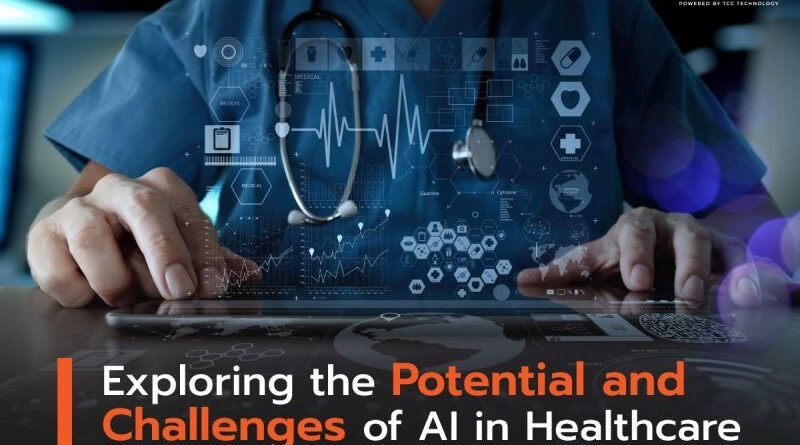Exploring the Potential and Challenges of AI in Healthcare
Exploring the Potential and Challenges of AI in Healthcare

Artificial Intelligence (AI) is revolutionizing various sectors, including healthcare. Recently, a group of healthcare providers, comprised of private hospital networks and related businesses, disclosed their investments in developing AI and machine learning (ML) technologies. They worked in collaboration with startups to innovate and enhance service capabilities in every dimension. They recognize that to maximize the benefits of these innovations it is essential to simultaneously develop user adoption among practitioners and patients.
OPEN-TEC, a technology knowledge-sharing platform, powered by TCC TECHNOLOGY GROUP, presents valuable insights fArtificial Intelligence (AI) is revolutionizing various sectors, including healthcare. Recently, a group of healthcare providers, comprised of private hospital networks and related businesses, disclosed their investments in developing AI and machine learning (ML) rom experts who participated in the discussion on “AI-Driven Innovation for Longevity” at TMA Digital Dialogue 2024. These insights highlight the potential of AI in supporting the medical industry, the adaptation of personnel and users in terms of skills, mindset, and system structure, and how these factors will contribute to the future success of businesses.
The Potential of AI to Support the Medical Industry
An executive from a sustainable innovation division within a healthcare provider organization noted that AI, combined with IoT medical tools, have been used for over 20 years in treatment planning, research, and personnel training (simulation/scenario training). The aim is to analyze and process large amounts of data, enhancing the visibility for decision-making, increasing accuracy, and reducing diagnosis time. Recently, AI has been used to manage complex genetic data, by reading lab test results to develop “personalized medicine plans,” to help improve the quality of life, in addition to supporting analysis of inherent genetic information and individual behavioral and lifestyle data.
Challenges and Scope of AI Involvement
A technology development expert explained that medical AI, particularly in the form of machine learning, has been in use for decades. An example includes healthcare API, which is used to detect diabetic retinopathy and read X-rays to determine disease severity for treatment planning. This was tested over use with tens of thousands of patients in Thailand. Generative AI, based on large language models (LLMs), uses vast amounts of data input to provide descriptive or summarized responses rather than simple yes/no answers, such as in medical reports.
However, this advanced capability brings challenges, like personal data responsibility, the risk of premature conclusions, decisions made without comprehensive evaluation, and ethical misuse. It is crucial for technology developers and users to put priority on the responsible governance to prevent negative impact.
In the scope of integrating AI into various sectors, it is crucial to recognize that AI will play a role “alongside humans and various professions,” whether in medicine, healthcare, or other fields. This understanding requires a shift in perspective and mindset: AI is not intended to replace humans or any professions but to support and enhance their work capabilities and daily lives (AI / Human-in-the-loop).
Promoting Learning and Enhancing User Skills
The director of an educational innovation center from a higher education institution emphasized that beyond gaining AI skills the right mindset is crucial for maximizing AI’s benefits for individuals and organizations. Future organizations may seek not just academically proficient individuals but also those experts at using AI, as it significantly enhances productivity. Skills like prompt engineering, which involves crafting precise instructions for AI tools, will become highly valuable for achieving complete and high-quality responses.
Educational institutions must also adapt by restructuring curriculum to align with future job market needs, preparing personnel for rapid technological changes. For example, medical training institutes can use AI for basic subjects or routine tasks, allowing more time for real patient cases, thereby elevating skills and learning efficiency.
Sustainable AI Usage
A sustainable innovation executive highlighted one of the key success factors in applying AI in organizations is the involvement and trust in AI tools among doctors and personnel. This is supported by allowing them the right to test and evaluate which developer can provide the suitable AI tools, which can ensure smooth and seamless integration with work processes.
Various developers have been included as a part of AI development plans for businesses with the increasing demand (Market Pull). These innovators are mostly national startups, that may not have many international success stories yet, but that have distinct advantages e.g. entrepreneurial spirit, unique viewpoints, skillful development teams, and passion for creating business-enhancing innovations (Technology Push). These strengths can replace the disadvantages, regarding the international success stories, and has strong potential to create a sustainable ecosystem in the long run.
Overall, AI technology holds significant potential to support the medical industry by enhancing analysis and processing massive amount of data, leading to more accurate and faster diagnosis and treatment. However, sustainable AI usage requires skill development and mindset changes among developers and users, and the adaptation of educational institutions to meet technological advancements while emphasizing governance principles to prevent negative impacts. Fostering a collaborative ecosystem for innovation will be a key factor to ensure the long-term benefits of AI technology.




